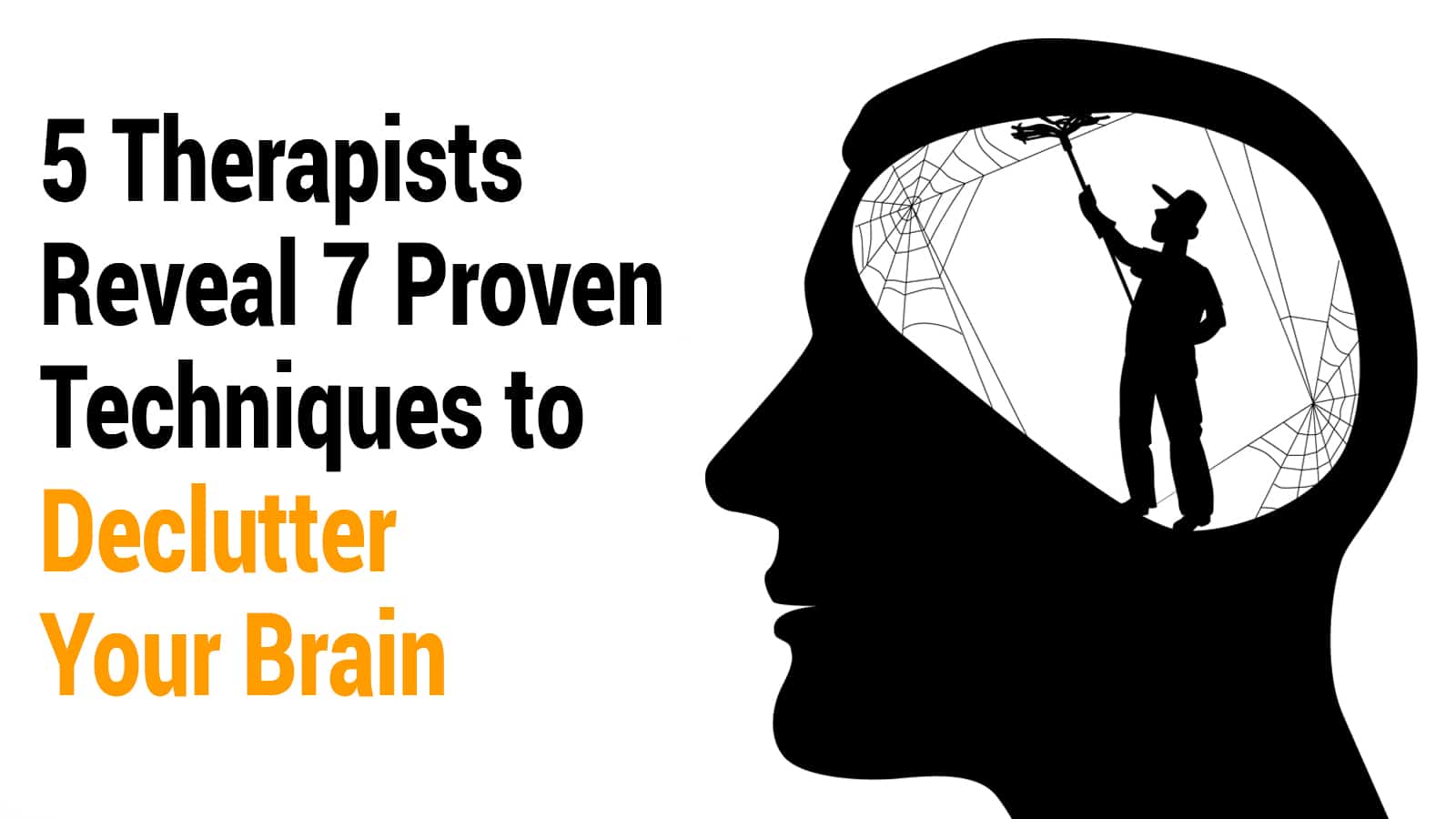Does your head ever feel muddled? Do you tend to get easily overwhelmed or confused? Do you have trouble organizing your mind and thoughts? If you relate to those statements, then your brain might be cluttered! Luckily, it’s something you can undo to declutter your brain.
Five leading therapists reveal the seven effective ways to declutter your brain for clarity in thoughts.
1. Challenge Feelings Of Self-Doubt
Self-doubt can be rooted very deeply, which means that telling yourself nice little words may not work. That’s why the trick is to challenge feelings, not merely try to brush them off or talk them down. Superficial platitudes are unlikely to work when your self-doubt is buried within your entire psyche.
 For example, you are unlikely to respond to phrases like:
For example, you are unlikely to respond to phrases like:
- “I’m awesome!”
- “These voices are lying, and I’m great!”
- “I can do it!”
According to the psychotherapist, licensed clinical social worker, and renowned mental strength expert Amy Morin, learning to declutter here requires not confidence but courage. Many people often assume that self-doubt can be conquered simply by becoming more self-assured, and while that is technically true, you can’t build that overnight. Accepting the fear and being brave in its face lets you take action.
What does this mean? The next time you see self-doubt forming, tell yourself that you’re taking that self-doubt as a challenge. This is because you’re trying to retrain your mind so that you learn, one step at a time, that your self-doubt is lying to you. It’s time to prove your own self wrong, and through this, you’ll slowly learn that your brain may not be right all the time!
2. Look For Movement And Sensation In The Natural World
The natural world is full of beauty and wonder, and there are ways you can engage your senses, muscles, and body in the world around you. This is a beautiful way to help declutter your mind, and it can also be good for your physical health.
Royal College of GPs chair Professor Helen Stokes-Lampard states that general practitioners have begun to use social prescriptions to help patients. This refers to using non-clinical recommendations to boost mental and physical health. The world outside gives people a chance to be active and expand their positive thinking and overall wellbeing.
The stress relief and wellness you may get from engaging in the natural world can help you declutter and gain clarity.
uHere are some ways to do so:
· Physical Connections To Nature
In this day and age, few people will come into close contact with nature more than a few times a year. Gone are the days of regular picnics and rolling around in the grass. Though, of course, some people in rural areas continue these acts, the fact remains that most people caught up in the hustles and bustle in the world don’t physically interact with nature as much as they used to. So do that! Go to a park and lie in the grass. Head to a quiet area and listen to the birds. Keep a plant. Do what you need to do to get close to nature!
· Movement In Nature
Just walking a little every day is a great way to clear your head, but doing it in nature is even better. Something is relaxing and restoring about performing even the simplest form of exercise outdoors. If you’re into sports, even better!
· Gardening
There are so many positive effects of gardening, and one of them is its ability to reduce stress levels and help your cognitive function. Merely taking care of living organisms is already an excellent way to manage negative moods, but doing it outdoors and in a physically active way helps even more.
3. Try Minimalism Lite
Minimalism is a great movement and style choice for decluttered thoughts, but of course, not everyone wants to go the whole mile with that. People can’t deny that some things that bring them joy are material items, and for those who like building collections of things, it may not be the best option.
But living a less cluttered life is still something that will transfer to your mental state. As a general rule, a chaotic environment will typically lead to a cluttered mind. If what you see the moment you wake up is a mess, you’re starting your day off with decreased positive thinking.
The act of cleaning itself can feel quite therapeutic, says Own Your Anxiety author and anxiety coach Julian Brass. As such, spending a little time decluttering can also help your brain naturally declutter itself as you go. This means that regularly removing excess stuff from your home can be just as helpful as maintaining minimal excess to begin with.
Here are some reasons you should try a lighter version of minimalism to reduce clutter in your life:
· It’s Demanding
Clutter and things in general demand space. They demand effort to move and clean. They require time to organize and money to buy. They can be overwhelming and require upkeep and maintenance. You won’t have time to keep a clear mind if you’re occupied with ways to handle your accumulated things.
· Possessions Don’t Carry Memories
Studies indicate that people often become attached to clutter and disposable items that hold some positive memories. Some don’t even have memories attached – they feel valuable, like something you’ve had for twenty years, even if you haven’t used it in ten. Some keepsakes are worth having, but worn-out shoes, tattered random magazines, and other damaged and unusable items with no significant sentimental value aren’t worth keeping around. It would be best if you didn’t have to rely on these items for mental security, and let go of them can free up mental space and declutter your brain.
· It’s Easier To Process
The brain can have difficulty processing very cluttered environments, as there’s a lot to take in at once. Clearing up and keeping clean, streamlined spaces also make it easier to spot any buildup of clutter to get rid of again.
 4. Separate Worry From Problem-Solving
4. Separate Worry From Problem-Solving
When faced with a difficult situation, problem-solving needs to be done. Overwhelming negative emotions can negate that right away. Of course, there is nothing wrong with feeling bad when things go south. The importance lies in separating those feelings from the actual issues you’re dealing with.
Morin makes the distinction clear. Problem-solving involves finding solutions, whether by changing the environment, addressing the issue, or finding ways to move on. On the other hand, ruminating in worry involves:
- Rehashing and replaying bad memories
- Second-guessing all the choices you’ve made so far
- Imagining the extraordinarily improbable and catastrophic worst-case scenario
- Going in circles of negative thought
Morin recommends spending 15 minutes daily dedicated to worrying and being anxious. Essentially, you set aside worries until you reach your dedicated 15 minutes, then worry as much as you want for that time, and stop when the time is up. Whenever new worries come, you can only sit in them and ruminate during those 15 minutes.
This allows you to remove the worst negativity from your day quickly, decluttering your mind so you can think more clearly and with sharper intent. It prevents you from being bogged down by unnecessary stress that clutters your mind!
5. Keep A Journal
Journaling is a proven method of maintaining positive thinking every day, and it also gives you an avenue to declutter your brain. Neuropsychologist Sanam Hafeez, Ph.D., states that journaling allows the mind to organize its thoughts, analyze them, and relax.
Research certainly agrees, as most studies indicate that journaling can boost positive thinking, reduce stress, and even improve thought clarity. When you journal, you:
- Get to express intrusive, embarrassing, and unwanted thoughts without judgment.
- Free up mental space for more pressing matters, decluttering your brain as you go
- Gain better cognitive resources and thought clarity
- Cope with negative emotions and situations in positive ways
Not much of a writer? Try using bullet journals or just writing a few sentences! Once you get into the habit, your words will flow easier each time.
6. Learn To Pause, Daydream, and Rest
In today’s busy world, it’s easy to feel like you need to keep going and going, even when you’re tired of longing for a break. There’s wisdom in learning to pause and take a break, especially if you allow your mind to wander a little. The excess clutter that crowds up your mental faculties won’t have the chance to be processed and diffused if you never rest.
Psychologist Jennifer Hughes, Ph.D., says that the human brain is designed to wander and daydream. It’s part of what allows for productivity, innovation, and creativity. Cluttered brains prevent that creativity from occurring, and studies have found that it’s most positive actually to let your brain daydream as it desires!
Sadly, many people equate daydreaming to laziness or idleness. That’s not the case. Haven’t you noticed that, after a brief break, you tend to be more productive? Pauses in tasks are crucial to the decluttering process – if you don’t give yourself time to breathe, stuff builds up in your head!
7. Don’t Wallow In Self-Pity
Self-pity is a pretty useless emotion. It’s not healthy or productive, unlike other negative emotions like sadness or anger. It merely involves magnifying current situations and making them big enough for you to sit in. It’s easy to get stuck when you pity yourself, and your brain gets more and more clogged up with your complaints and muddy thoughts.
Morin recommends stopping pity parties in their tracks by circumventing them with something positive. Even if you can’t solve the issue causing those feelings, at least turn your attention to something productive and useful. She also cautions against using red flag self-pity language, such as:
- Why does bad stuff always happen to me?
- Nobody understands me!
- No one ever wants to hang out with me.
These kinds of phrases perpetuate the pity cycle, further taking up space in your mind. You’re much better off letting go of these thoughts. Instead of wallowing because your date canceled on you, spend the night treating yourself! Or, instead of getting stuck in the knowledge that you can’t solve the health issue of a relative, turn that energy to volunteer work that supports a relevant health cause. It makes all the difference.
 Final Thoughts On Some Effective Ways To Declutter Your Brain For Clarity In Thoughts
Final Thoughts On Some Effective Ways To Declutter Your Brain For Clarity In Thoughts
A cluttered brain is hard to work with! It tends to make bad decisions, worsens negative mood, and makes you feel bad in general. Make sure to take the time to declutter your brain regularly, and you’ll enjoy clearer, more workable thoughts and a more relaxed life!

















